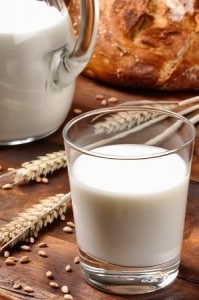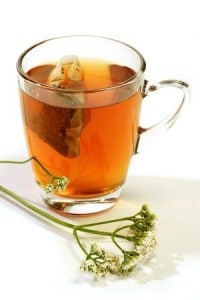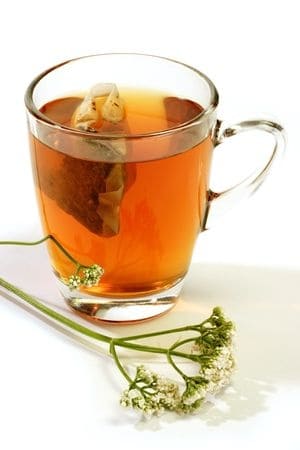Insomnia remains the most common sleep complaint amongst Americans. Many sufferers of insomnia find their day to day lives deeply affected by a continual lack of sleep and often present to their doctor, resorting to a recommended prescription of sleeping tablets. Although this is a short-term fix, sleeping pills come with many potential side effects and the risk of addiction (both psychologically and physically) is increased each time you use the medication. There are many other natural methods you can try to improve your sleeping patterns.
Milk
The age old ritual of drinking a glass of warm milk before bed still holds true today. This theory has been around for thousands of years and remains popular in the practice of Ayurvedic medicine. Milk is rich in a particular amino acid called “tryptophan” which assists in the production of melatonin and serotonin.  Both of these chemicals are produced by the brain which is associated with relaxation and sleep. Aside from milk being found to assist with sleep from a scientific standpoint, there are also deep psychological ties with drinking a glass of warm milk before bed. Milk is associated with mothers and the comfort of being in her embrace, many children growing up are introduced to the ritual before being tucked into bed. There are strong memories associated with a glass of warm milk and a loving and safe environment. The warmth of the milk also raises the body temperature and relaxes the muscles, preparing the body for rest. Drink a small glass of milk sweetened with honey each night, 30 minutes before going to bed.
Both of these chemicals are produced by the brain which is associated with relaxation and sleep. Aside from milk being found to assist with sleep from a scientific standpoint, there are also deep psychological ties with drinking a glass of warm milk before bed. Milk is associated with mothers and the comfort of being in her embrace, many children growing up are introduced to the ritual before being tucked into bed. There are strong memories associated with a glass of warm milk and a loving and safe environment. The warmth of the milk also raises the body temperature and relaxes the muscles, preparing the body for rest. Drink a small glass of milk sweetened with honey each night, 30 minutes before going to bed.
Valerian + Hops
Another ritual that dates back in time in aiding sleep is the extract of valerian root and hop combined. Mystery still remains as to how these two powerful natural extracts interact with each other to create a sedative effect, but it is interesting to note that if ingested alone, they pose no positive effect on sleep patterns. Many trials and studies have been carried
out that prove that valerian/hops is an effective sleep aid, and is popular as a self-administered remedy that poses no side effects.
You can drink valerian+hops tea but it does have an extremely bitter taste so be sure to add a sweetener. Most people much prefer to buy capsules or tinctures which are available at your local pharmacy or naturopath.
Supporting healthy sleep patterns naturally is the key to tackling insomnia. There is no habit-forming risk in using remedies straight from mother nature. The effects of natural remedies can also be increased, when used in combination with other calming pre-sleep rituals such as meditation. Downloading a guided meditation recording is also great to listen to when drifting off and assists in calming the mind of racing thoughts.
Trypnaural Brainwave Entrainment + Melatonin
Melatonin Maker Meditation
This Trypnaural B.E session is designed to take you from a waking beta state through, alpha, theta then delta to help stimulate the production of melatonin so you get the most restful nights sleep too.
The video is designed to give you a visual guided meditation from day turning into night, helping your mind relax and flow into a deep delta sleep.
This is just one 30 minute audio from the full Deep Sleep System you can purchase here.
However if you join as a Trypnaural member today you can download over 10+ hours of the best quality brainwave audios you may find online. Learn more about our available options here
Melatonin – Your Vital Hormone
Melatonin is a hormone produced by your pineal gland that regulates your wake/sleep cycle. One of its main roles is to help you get to sleep.
Science strongly shows how melatonin could be the most vital hormone for your health.
According to renowned Osteopathic Physician, Dr. Joseph Mercola, “Melatonin has roles in cancer prevention, strengthening your immune system, and may even slow down cellular aging; in fact, it has been the subject of preclinical research on over 100 different disease applications.1 It’s your body’s “Superhero of the Night,” and light is his number one nemesis.”
Artificial lighting actually disrupts melatonin production and in our 24/7 world where the cities rarely sleep or close for the night, many people are becoming deficient in this power hormone.
Melatonin – Anti-Inflammatory, Anti-aging, Mood Booster.
You learned earlier about the acid-alkaline balance and the importance of mopping up excess oxidants by antioxidants. Melatonin is actually one of your most powerful natural antioxidants. It has a very powerful anti-inflammatory effect and without it, it causes your thymus gland, a major component of your immune system to actually shrink in size.
Studies have shown that a deficiency of melatonin can lead to the following health problems:
- Decreased immune function
- High blood pressure and heart disease.
- Increased risk of Alzheimer’s, cancer, depression, obesity/weight gain and other autoimmune disorders.
The moment you turn on your light at night, you confuse your brains interpretation of whether its day or night. Your brain thinks its day-time and this signals your pineal gland to stop producing melatonin. Even if you just switch on the light for a second, your melatonin pump usually does not switch back on until the following night.
How to Increase Your Melatonin Levels
You can actually artificially increase your melatonin levels by taking supplements, and, in some cases, doctors are prescribing melatonin supplements for issues like insomnia. You can also find melatonin in a variety of foods such as bananas, oats, rice almonds, coriander, and goji berries. In recent times medicinal marijuana has been widely legalized around several states in the US and one of its main prescriptions is for insomnia. Cannabis actually creates a huge surge in melatonin production from the pineal gland. Cannabis has also shown in various studies to decrease the growth of cancerous tumours and low melatonin levels are associated with an increased risk of cancer.
- Try to get real natural light exposure daily – Your pineal gland only produces melatonin when there is a sufficient contrast between the level of light you’re exposed to during the day in relation to the level of light you’re exposed to at night. So, the pineal gland will not begin to produce melatonin if you are in darkness most of the day, as it won’t be able to tell the difference between night and day.
- Sleep in complete darkness when possible – A slightest glow from an alarm clock, a laptop or mobile phone and even street lights will disrupt the sleep/wake cycle and prevent the production of melatonin, as artificial light like this confuses your brain. Keep electrical equipment at a distance or switched off and make sure your curtains are fully drawn to make your room as dark as possible.
- Avoid using your computer or watching TV for at least 1hr before going to bed – Artificial light confuses the sleep/wake cycle and prevents the production of melatonin.
- Use low wattage yellow, orange or red light bulbs if you need a source of light at night –Light in this bandwidth does not shut down melatonin production whereas artificial blue light emitted by most other light bulbs and electronic devices do.
- Keep your room at night cool, no higher than 70C – Keeping cool at night is the optimum way to sleep and boost melatonin production.
- Take a hot bath, use a sauna or steam room 90 to 120 minutes before you sleep – this increases your core body temperature and the immediate drop when you stop switches on the sleep response in your body.
- Become a sun worshipper – if it is possible try to wake up with the sun and catch some rays for at least 15 minutes at dawn. This helps boost your natural production of vitamin D at the start of the day and also helps create a strong contrast between day and night, helping you boost melatonin production at night. Many experienced meditators enjoy a morning meditation and a well-known yoga technique known as sun salutations is performed first thing in the morning.
- Throw out your loud alarm clock – many studies have shown that waking up with a loud alarm clock causes harmful stress. If you can avoid using an alarm clock your mind and body will love you.
- Meditate – In 1995, researchers at the University of Massachusetts Medical Center’s Stress Reduction and Relaxation Program found that meditators had significantly higher melatonin levels than non-meditators. They also found that when the test subjects did not mediate, their melatonin levels did not increase that night. The conclusion was that daily meditation, particularly before bedtime, increases melatonin production. Another study by Vincent Giampapa, MD, showed an astonishing average 98% increase in melatonin among study participants who meditated.
Resources: Sedative effects of Tryptophan: http://www.ncbi.nlm.nih.gov/pubmed/19715722
Valerian/hops clinical trial:Effects on mild insomnia: http://www.ncbi.nlm.nih.gov/pubmed/16335333




Leave A Comment